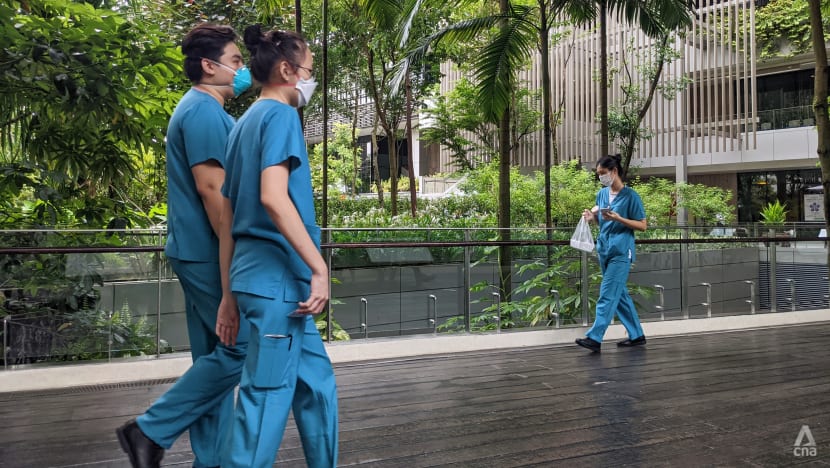What will it take to retain foreign nurses when some see Singapore as a stepping stone to the West?
While Singapore ranks well for foreign nurses to work within Asia, the city may pale in comparison compared to the West, said the CEO of a healthcare recruitment agency.

Nurses at Khoo Teck Puat Hospital. (File photo: Try Sutrisno Foo)
SINGAPORE: Retaining foreign nurses in Singapore can be a challenge, and among the issues is that the nation is seen as a stepping stone to other countries.
Singapore’s healthcare training is valuable and is “sought after” across the world, said CEO of recruitment agency People360 Services Jordache Keith.
Instead of hiring nurses directly from their home countries and training them, some Western nations hire those with experience overseas, he said.
It is a “pretty known fact” that working here is seen as a route to the West, he told CNA podcast Heart of the Matter.
Senior Parliamentary Secretary for Health Rahayu Mahzam, who joined Mr Keith on the show, said in response: “We've heard this and we‘re clearly bothered.
“We work so hard in providing the training and then when they're well trained (and leave), it's a loss to us.”
There is a need to expand the workforce of nurses and support care staff to 69,000 in 2030 because of an ageing population, Ms Rahayu said. As at the end of last year, Singapore had 49,000 nurses and support care staff.
Amid a crunch in nursing manpower, Singapore will add close to 4,000 new nurses to its workforce by the end of this year, Health Minister Ong Ye Kung announced in November last year.
Of the additional staff, about 60 per cent will be from abroad to make up for the slowdown in foreign nurse recruitment due to COVID-19 border restrictions.
PUSH AND PULL FACTORS
This “stepping stone” perception of Singapore is one of “multiple reasons” foreign nurses leave, said Mr Keith.
They may also want to return home to their families after several years away from them, or want a change of environment, he said.
However, an attractive remuneration may help retain them, said Ms Rahayu.
While money is just one aspect, it is “important to structure that properly because people need to be acknowledged and remunerated”, she said.
“We are thinking about and working on retention benefits for nurses, a long-term scheme that hopefully will continue to encourage them to just want to stay in the profession,” she said.
Group chief nurse of the National Healthcare Group Associate Professor Yong Keng Kwang said that nurses were already leaving Singapore to work in the West when he joined the profession about 30 years ago.
“Today, if you spot any of them leaving, most of them will not tell you it’s because of the money. Because we are doing well with money. They will still cite the fact that it is associated with family, and the fact that they want to travel the world,” he said.

However, they are not likely to talk about going overseas when it comes to professional development, as the opportunities offered here are “equally good”, he said.
One of the “marked changes” in recent years is the remuneration package, which has helped to reduce the need for these nurses to move overseas, he said.
TACKLING THE PAIN POINTS
The government is addressing pain points such as abuse, harassment and well-being, Ms Rahayu said.
“We're using technology to augment some of the jobs,” she said, adding that patient care assistants also ease nurses’ burden.
Assoc Prof Yong said one important factor that impacts nurses is the support they get from their institutions.
“What they want, really, is that when something bad happens to them, the organisation is behind them … Maybe 20 years ago, we were not as good, but in recent years, we're very sensitive to such matters,” he said.
“We take care of them whenever such incidents happen. Our response is fast. They do feel protected. Even if the patients or the family are the perpetrators, they know that the organisation is behind (them).”
Ms Rahayu added that there is a larger issue of how accepting and welcoming of foreigners Singapore is as a society.
HOW SINGAPORE RANKS
When asked how Singapore ranks for foreign nurses to work in, Mr Keith said that the city is “probably the top choice” in Asia. However, when compared to the West, it may pale in comparison.
For instance, some countries may allow nurses’ dependants to accompany them, and even provide free education for their children. He acknowledged that Singapore is limited in terms of land size.
He added that rental fees for flats here may account for a big proportion of foreign nurses’ salaries, describing it as a “pain point”.
“Their first question is ‘if I'm going to pay for my rental beyond my allowances, how much more do I have to dig into my basic salary? And I think that's one of the push backs,” he said.
Ms Rahayu said the government’s plan to provide hostel-type housing facilities for some foreign healthcare workers who are new to Singapore may provide a solution to the issue.
NEED FOR MORE OPPORTUNITIES
Assof Prof Yong said that while there are professional opportunities for nurses here, there is a need for more.
“There are more and more nurses. So the current resources for career development opportunities will also have to be sized up accordingly,” he said, when asked what he would like to change.
He added his wish is that there will be more opportunities to showcase the value of nursing.
He would want to introduce more professional autonomy for nurses to do more for patients, which they are more than capable of today because of the training that they have received, he said.
While Advanced Practice Nurses (APNs) are now given the autonomy to make some decisions, including prescribing medications, “we are hoping that you could go down the chain a bit more to some of our more senior experienced nurses who are not APNs”, said Assoc Prof Yong.
When patients see nurses more involved in patient care, consulting and making decisions, they may feel that nurses are not always deferring to the doctors, while ending up “doing all the cleaning work”, he said.

















